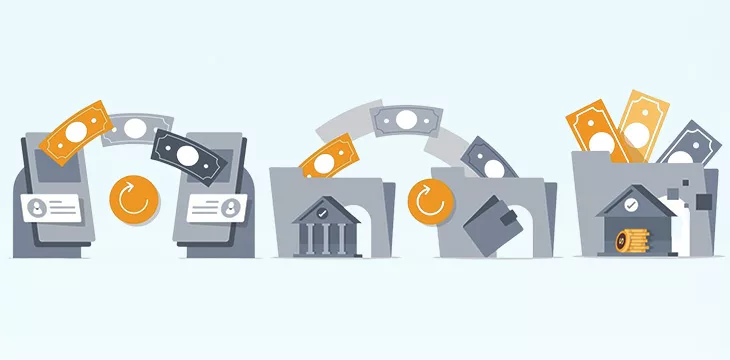|
Getting your Trinity Audio player ready...
|
Most people have heard of digital ledgers, blockchains, and smart contracts by now. In this article, we will explore them further and explain how they can work together to create programmable payments.
Programmable payments can best be defined as payments executed when pre-programmed conditions are met. For example, we could set up a smart contract on the BSV blockchain stating that if an athlete wins the men’s 100-meter sprint at the Paris Olympics 2024, I pay you $100, but if he does not, you pay me $100.
The rest of this article will explore how programmable payments work, what we can do with them, and how to set them up.
Programmable payments vs. programmable money
A closely related but different term is programmable money. The two are related but different, so it’s important to differentiate between them.
While programmable payments relate to the conditions under which an automatic payment should be made, programmable money is defined as a digital currency that can have certain rules programmed into it. For example, a welfare payment made with a central bank digital currency (CBDC) could have conditions programmed into it, such as that it can only be spent at specific retailers or on items such as food.
In a nutshell, programmable payments refer specifically to the automation of payments based on predefined conditions, but programmable money is a broader concept whereby the digital currency itself can have embedded rules.
What can we do with programmable payments?
Believe it or not, programmable payments exist, at least in some form; subscriptions are one example. Most of us have at least one, and the payments for these simply follow the rules agreed on by two parties, which a computer executes.
Subscriptions can also happen on the blockchain via smart contracts. If desired, SaaS and streaming platforms can utilize a subscription model, and smart contracts can handle everything.
Programmable payments on the blockchain can also automate escrow services. Real estate transactions, freelance work projects, and purchases on online marketplaces are also examples of potential programmable payments.
DeFi is another example of an area where programmable payments could be crucial. While DeFi will have to comply with KYC/AML and other financial regulations, many of the processes around lending, borrowing, and other associated activities like staking can be and have been automated. Again, smart contracts are the key to all of this.
Payroll, insurance payouts, charitable donations, royalty payments, and all sorts of other payment types can be programmed and automated. When micropayments are combined with programmable payments, all kinds of new business models and revenue streams become possible.
Ok, but aren’t these automated anyway?
Yes, many of these payment types can be and are already automated. So, why do we need to use smart contracts and blockchain technology? Isn’t it expensive and slow?
While it’s true that some blockchains, such as Ethereum, are expensive and slow, others, such as BSV, are not. On the latter, transactions cost fractions of a cent, and millions of transactions per second are theoretically possible.
So, why use blockchains? There are a few good reasons.
First, blockchains are public ledgers, and each transaction is time-stamped and immutable. All parties to a payment can prove it has been made with zero room for debate. Everyone can much more easily track, trace, and audit payments.
Second, proof-of-work blockchains are highly secure. The original Bitcoin blockchain utilizes SHA-256 encryption and a distributed node structure, meaning payments are safe and secure.
Third, blockchain payments are peer-to-peer in nature. They reduce the need for intermediaries, simplify payments, reduce risk, and lower costs. They make tiny payments possible as well as larger ones.
Programmable payments on blockchains also allow for much more complex conditions and logic. For example, digital rights management platforms enable artists to be paid a percentage each time something they collaborate on sells. For the first time, the artist who designed an album cover could get paid automatically each time a copy of a track is sold. Dozens of people could be involved, each with agreed-on percentages, receiving real-time payments to their wallets.
Speaking of real-time payments, programmable payments also settle in real-time. Once they’re included in a block, they arrive seconds later. Unlike bank transfers and credit card payments, which can take days to settle, blockchain payments use electronic cash and are settled instantly upon arrival.
Global accessibility is another benefit of programmable payments on blockchains. Anyone with a free mobile wallet can access and use them, participate in them, or set them up. Of course, financial rules and regulations will apply over certain limits, but blockchains are permissionless, and any two parties anywhere on the planet can transact within the law.
Try your own programmable payment on the BSV blockchain
Experiencing programmable payments on the most scalable utility blockchain could be straightforward or more complex, depending on your needs.
To get a feel for how they work and how they can simplify things, try LilBit or PeerGame on the BSV blockchain. These are gambling apps, so make sure you’re of age and in a jurisdiction where it’s legal to use them. Once you try them, you’ll see how simple they make things and how they will revolutionize industries needing a shakeup.
Alternatively, you can learn to write, compile, and deploy smart contracts on BSV using sCrypt.
Listen to sCrypt Founder Xiaohui Liu talk about their work in the video below:

 02-15-2026
02-15-2026 




